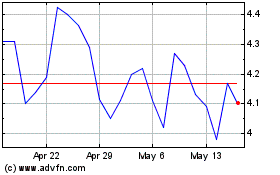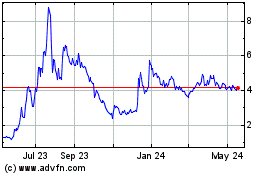Marker Therapeutics, Inc. (Nasdaq: MRKR), a clinical-stage
immuno-oncology company focusing on developing next-generation T
cell-based immunotherapies for the treatment of hematological
malignancies and solid tumor indications, today provided an update
on the progress and clinical observations from the Phase 1 APOLLO
study, with a data cutoff date of September 10.
The Company’s Phase 1 APOLLO study is
investigating MT-601, a multi-antigen recognizing (MAR) T cell
product (formerly known as multi-tumor associated antigen-specific
T cells, or multiTAA), in patients with lymphoma who have relapsed
after anti-CD19 chimeric antigen receptor (CAR) T cell therapy or
where anti-CD19 CAR-T cells are not an option. A total of 10
patients have been treated in the study, for which clinical data is
currently available for 9 patients from 5 clinical sites across the
United States. Study participants showed early objective responses
with and without lymphodepletion. However, immunomonitoring data
confirmed that lymphodepletion enhanced the expansion and
persistence of MAR-T cell clones in vivo.
Key findings from the APOLLO study include:
- SafetyInfusion of
MT-601 was well tolerated in all study participants, with no
observation of immune-effector cell associated neurotoxicity
syndrome (ICANS) and one reported Grade 1 cytokine release syndrome
(CRS). No dose limiting toxicities (DLTs) have been reported to
date.
- EfficacyIn the
first dose cohort, 7 out of 9 patients achieved objective responses
(78%) at first response assessment, with 4 patients demonstrating
complete response (CR; 44.4%) (Table 1).
- Time in
Follow-UpLong-term follow-up of 6 to 12 months is
currently available for three patients (Table 2). Ongoing follow-up
visits are being conducted to assess the durability of responses.
All study participants are monitored closely to ensure
comprehensive data collection and patient safety.
Table 1: MT-601 shows objective responses at
first disease assessment.
|
No. of PatientsTreated* |
No. Prior Linesof Therapy |
Response Rate atFirst Assessment |
CR at FirstAssessment |
|
9 |
3 - 12 |
78 |
% |
44.4 |
% |
CR, Complete Response. Data as of September 10,
2024.
Table 2: Duration of patient follow-up in Phase
1 APOLLO study.
|
Longest Follow-Up |
No. of Patients |
Clinical Response |
|
≥ 12 months |
1 |
CR |
|
≥ 6 months |
2 |
CR, PR |
|
1-4 months |
4 |
CR, PR |
CR, Complete Response; PR, Partial Response.
Data as of September 10, 2024.
“We are encouraged by the positive clinical
outcomes we are observing in our Phase 1 APOLLO study,” said Monic
Stuart, M.D., CMO of Marker Therapeutics. “Observing objective
responses at the first response assessment in patients who have
been heavily pre-treated and have relapsed after 3 to 12 prior
lines of therapy, including CAR-T cells and bispecific antibodies,
is a tremendous achievement and we are encouraged by the benefit
and hope our therapy may provide to patients and their families. We
will continue to monitor long-term treatment effects and durability
of response and look forward to enrolling additional participants
in this study.”
Although CD19-targeting CAR-T cell therapies
have gained acceptance as treatment for patients with lymphoma,
40-60% of patients relapse within the first year of treatment
(Chong et al, N Engl J Med, 2021; Neelapu et al, Blood, 2023.).
These post-CD19 CAR-T relapsed patients currently have no approved
standard of care, illustrating a high unmet medical need and
urgency for new therapies. In addition, CAR-T cells are associated
with severe side effects such as CRS or ICANS and may increase the
risk for secondary malignancies (U.S. Food and Drug Administration,
November 28, 2023). Data from clinical trials to date have
demonstrated that MAR-T cells are well tolerated with no evidence
of ICANS. In addition, Marker’s non-engineered MAR-T cell approach
selectively expands natural tumor-specific T cells from a patient’s
blood that can recognize a broad range of tumor antigens,
minimizing the risk of mutagenesis.
“We are enthusiastic about the progress we have
made with MT-601 and our study in patients with lymphoma who have
relapsed after CD19 CAR-T cell therapy and for whom there is
currently no approved drug on the market,” said Juan Vera, M.D.,
President and CEO of Marker Therapeutics. “We believe that MT-601
can address this unmet medical need in a large and growing patient
population. We will continue to treat additional participants in
this Phase 1 study to validate our observations and to gather
comprehensive safety and durability data to identify the best
developmental strategy for MT-601 development in patients with
lymphoma.”
About MT-601The Company’s lead
product, MT-601, is a multi-antigen recognizing (MAR) T cell
product that utilizes a non-genetically modified approach that
specifically targets six different tumor antigens upregulated in
lymphoma cells (Survivin, PRAME, WT-1, NY-ESO-1, SSX-2, MAGEA-4).
Marker is currently investigating MT-601 in the Company-sponsored
Phase 1 APOLLO trial (clinicaltrials.gov identifier: NCT05798897)
for the treatment of patients with lymphoma who relapsed after or
are ineligible for anti-CD19 CAR-T cell therapies.
About APOLLO The APOLLO trial
(clinicaltrials.gov Identifier: NCT05798897) is a Phase 1,
multicenter, open-label study designed to evaluate the safety and
efficacy of MT-601 in participants with relapsed or refractory
lymphoma who either failed anti-CD19 chimeric antigen receptor
(CAR) T cell therapy or are ineligible for anti-CD19 CAR-T cell
therapy. The primary objective of this exploratory Phase 1 clinical
trial is to evaluate the optimum dose, safety, and preliminary
efficacy of MT-601 in participants with various lymphoma subtypes.
Under the APOLLO trial, it is anticipated that nine clinical sites
across the United States will cumulatively enroll up to
approximately 30 participants during the dose escalation phase.
About MAR-T cellsThe
multi-antigen recognizing (MAR) T cell platform (formerly known as
multiTAA-specific T cells) is a novel, non-genetically modified
cell therapy approach that selectively expands tumor-specific T
cells from a patient's/donor’s blood capable of recognizing a broad
range of tumor antigens. Unlike other T cell therapies, MAR-T cells
allow the recognition of hundreds of different epitopes within up
to six tumor-specific antigens, thereby reducing the possibility of
tumor escape. Since MAR-T cells are not genetically engineered,
Marker believes that its product candidates will be easier and less
expensive to manufacture, with an improved safety profile compared
to current engineered T cell approaches, and may provide patients
with meaningful clinical benefits.
About Marker Therapeutics,
Inc.Marker Therapeutics, Inc. is a Houston, TX-based
clinical-stage immuno-oncology company specializing in the
development of next-generation T cell-based immunotherapies for the
treatment of hematological malignancies and solid tumors. The
Company was founded at Baylor College of Medicine, and clinical
trials that enrolled more than 200 patients across various
hematological and solid tumor indications showed that the Company’s
autologous and allogeneic MAR-T cell products were well tolerated
and demonstrated durable clinical responses. Marker’s goal is to
introduce novel T cell therapies to the market and improve patient
outcomes. To achieve these objectives, the Company prioritizes the
preservation of financial resources and focuses on operational
excellence. Marker’s unique T cell platform is strengthened by
non-dilutive funding from U.S. state and federal agencies
supporting cancer research.
To receive future press releases via email,
please visit: https://www.markertherapeutics.com/email-alerts.
Forward-Looking StatementsThis
release contains forward-looking statements for purposes of the
safe harbor provisions of the Private Securities Litigation Reform
Act of 1995. Statements in this news release concerning the
Company’s expectations, plans, business outlook or future
performance, and any other statements concerning assumptions made
or expectations as to any future events, conditions, performance or
other matters, are “forward-looking statements.” Forward-looking
statements include statements regarding our intentions, beliefs,
projections, outlook, analyses or current expectations concerning,
among other things: our research, development and regulatory
activities and expectations relating to our non-engineered
multi-tumor antigen specific T cell therapies; the effectiveness of
these programs or the possible range of application and potential
curative effects and safety in the treatment of diseases; the
timing, conduct, interim results announcements and outcomes of our
clinical trials of our product candidates, including MT-601 for the
treatment of patients with lymphoma. Forward-looking statements are
by their nature subject to risks, uncertainties and other factors
which could cause actual results to differ materially from those
stated in such statements. Such risks, uncertainties and factors
include, but are not limited to the risks set forth in the
Company’s most recent Form 10-K, 10-Q and
other SEC filings which are available through EDGAR
at WWW.SEC.GOV. The Company assumes no obligation to update
its forward-looking statements whether as a result of new
information, future events or otherwise, after the date of this
press release except as may be required by law.
ContactsInvestorsTIBEREND
STRATEGIC ADVISORS, INC.Jonathan
Nugent205-566-3026jnugent@tiberend.com
Marker Therapeutics (NASDAQ:MRKR)
Historical Stock Chart
From Dec 2024 to Jan 2025

Marker Therapeutics (NASDAQ:MRKR)
Historical Stock Chart
From Jan 2024 to Jan 2025
